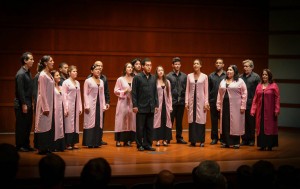By Darwin Manning
manningd@grinnell.edu
This week it was not only election politics that infiltrated Grinnell, but also Cuban music, in the form of the Cuban choir Schola Cantorum Coralina. Last Wednesday night, the group performed several different styles of music, from contemporary to popular Cuban, and other Latin-American influenced pieces.

The group was originally recruited by John Rommereim, Music, when he traveled to Cuba as part of a national choir directors group. During his trip, Rommereim listened to upwards of thirty performances and met many well-known conductors.
As a result, he decided to bring Alina Orraca, the conductor of Schola Cantorum Coralina, last spring.
Unfortunately, their first attempt to visit had to be canceled due to an invitation to perform for the Pope in Cuba.
Afterward, the group planned another U.S. tour of several cities, including Boston, Chicago and Minneapolis. When Rommereim heard about their new tour, he once again reached out. With the help of several groups on campus, he at last managed to bring Schola Cantorum Coralina to campus.
“When I heard that [Schola Canotrum Coralina] was touring the U.S., I was able to have them add Grinnell to their trip itinerary,” Rommereim said. “This concert was a tribute to the various groups on campus and their ability to step up.”
The choral group arrived in Grinnell on Monday and hosted an open discussion on Wednesday about cultural diplomacy, prior to their performance. Grinnell Singers prepared two Cuban pieces for the rehearsal, combining forces Tuesday afternoon with Schola Cantorum Coralina to ultimately sing in unison, an unforgettable experience for the Grinnell Singers and Rommereim.
“Having [Orraca] work with the group was something truly special,” Rommereim said. “We got a sense of the spirit of the music and what we’re singing.”
Schola Cantorum Coralina breathes dedication to their music, practicing five days a week for hours on end.
“We want the audience to take away the feeling that this music lays within all of our souls and is part of us all,” Orraca said through an interpreter. “We want spectators to become more interested in Cuban choral music and we hope that those who go to the concert come out with a great feeling of joy from the music.”
Rommereim worked diligently to bring Schola Cantorum Coralina to Grinnell because he believes that this music is truly a special gift to hear.
“The first amazing attribute is the wonderful spirit, enthusiasm, expression and vitality in this group, though it is also wedded with great artistry, precision and care to fashioning the details of the performance,” Rommereim said.
The group has enjoyed each stop during their first tour in the U.S. Additionally, they have been amazed at the willingness of each place to embrace them. One of their members and the daughter of the conductor, Isabel Gutierrez Orraca, felt privileged for their chance to make this excursion.
“Every place we have been has been truly amazing. Each stop, the audience has been grateful to us, and we are grateful to be here,” Guiterrez Orraca said. “I feel the U.S. and Cuba are getting closer, it’s a very good start to building a stronger relationship.”
Schola Cantorum Coralina’s visit coincided with a number of prominent events. Just before they departed from Cuba, Hurricane Sandy significantly damaged their home country. When they arrived in Washington D.C., the area was also under siege from the storm. As the guests of Grinnell residents, Schola Cantorum Coralina watched the U.S. elections, which incidentally occurred soon after the 50th anniversary of the Cuban Missile Crisis.
While tensions remain between the two countries’ governments, these spirited ambassadors may be precisely what the U.S. needs. Dressed in black and pink, singing angelically, the group blessed all those in attendance, leaving the audience with a passion and peaceful memory that won’t soon be forgotten.
“Having them here is something of value in itself, to get a window to the style of Cuban music, but also very fine music making to a style we are less familiar with,” Rommereim said.




























































